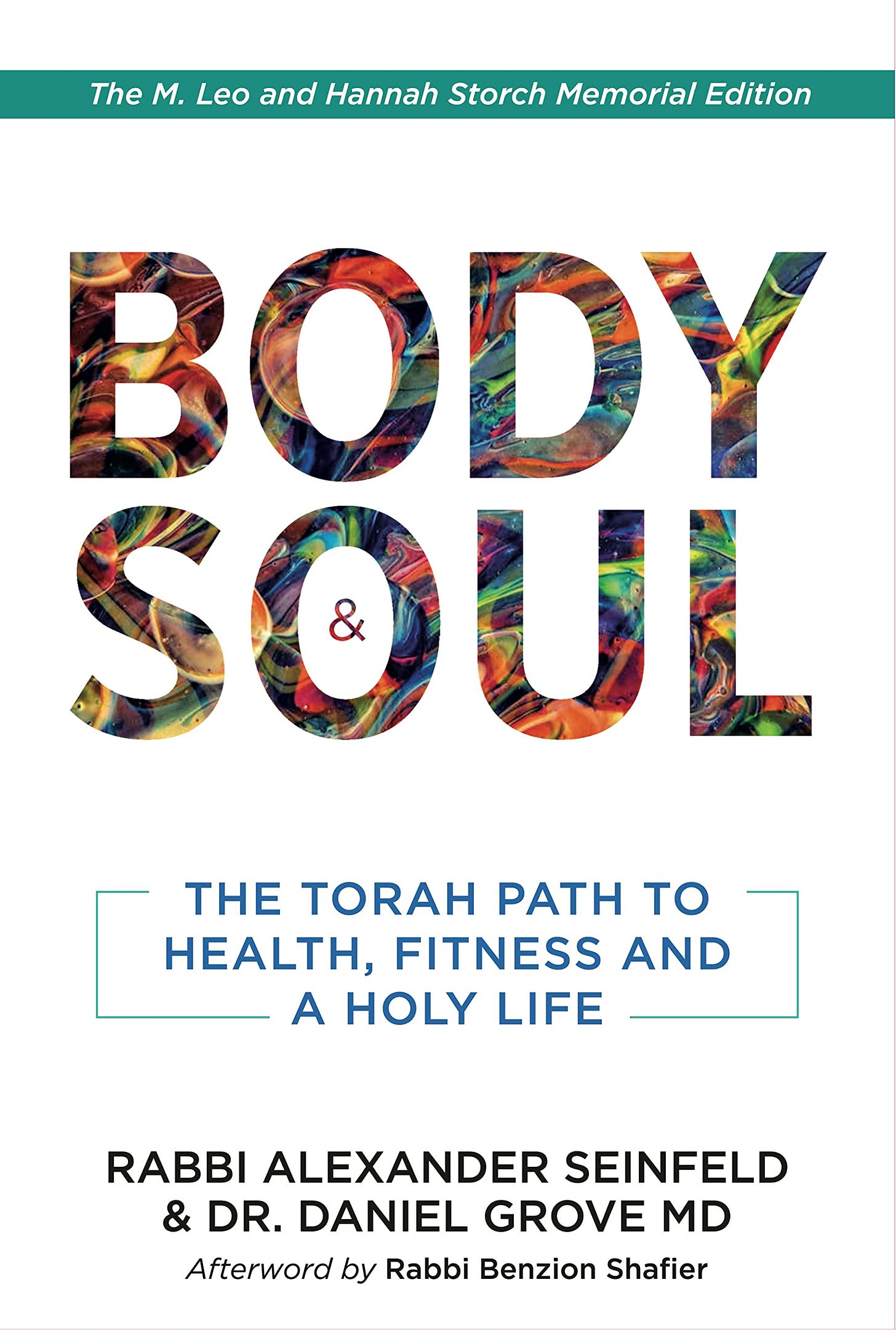Is Healthy Living Jewish?
A book review of Body and Soul: The Torah Path to Health, Fitness, and a Holy Life
Dear Healthy Jew,
When I heard about the new book, Body and Soul: The Torah Path to Health, Fitness, and a Holy Life, by Rabbi Alexander Seinfeld and Dr. Daniel Grove, my second reaction – right after “they beat me to it” – was excitement that other people are working to promote health and wellness in the Jewish community.
One of my favorite parts of Body and Soul is the book’s systematic approach to health, as outlined at the end of Chapter One (pp. 14). The authors first devote two chapters to “appreciating the body,” drawing from a wealth of Torah sources to explain how our bodies are vehicles for the soul and therefore worthy of respect and protection. Then they cover the dangers of added sugar – which, as I’ve explained in these pages, is not just another unhealthy ingredient but a tempting, potent, and destructive approach to life. After laying down the parameters of healthy living, Body and Soul dives into the specifics of healthy lifestyle.
After carefully reviewing the book, I’m confident that religious Jews who read Body and Soul will receive great guidance on the value of choosing health and what that means practically. I say this even though I respectfully disagree with many of Body and Soul’s central themes and recommendations (more on that later).
In this review, I won’t present a fawning, flattering summary of the book’s highlights. Instead, I'll explain in my own words why Body and Soul’s publication is exciting news for the religious Jewish community, and why, if you’re a religious Jew, it’s a great idea to buy, read, and live by its suggestions.
Is Healthy Living for Religious People?
There are three ways a religious person can view health and wellness.
All that matters in life is knowing and emulating God. If we take care of our bodies and minds, it’s only as a meaningless prerequisite for spiritual work. Maybe we shouldn’t even waste valuable time on health; better to let God decide the quality and quantity of life we need and deserve.
Health is everything. God gave us life on earth, and all He wants is that we should be strong and feel great with ourselves. That’s what religion really is about!
The purpose of life is to know and emulate God – but caring for our health still holds deep spiritual value. Wellness enables us to know God, and anything done for the purpose of knowing God is emulating His balanced and purposeful ways.
The Middle Way of Health
At Healthy Jew, we follow Maimonides’ dictum that health means balance1 because it’s always found in the middle, between opposing extremes. So it’s unsurprising that Maimonides’ emphatically voted for the third approach to health:
The body being healthy and whole is from the ways of God, because when one is sick it’s impossible to understand or know anything about the Creator. Therefore, a person must distance himself from the things that destroy the body and accustom himself to things that are healthy and convalescing.2
Moreover, choosing health isn’t just another “way of God,” but, as we’ve discussed many times, it’s the first step toward a purposeful, genuinely human life. Why? Another Maimonidean principle: When our minds guide our bodies to act for the purpose of health, we become true human beings, graduating from mere animals that look like humans.3
Body and Spirit
God could have made things simpler. He could have assumed sole responsibility for our health, allowing us to focus only on purely spiritual endeavors. On the other extreme, He could have consolidated our existence inside the body: what’s good for us is good for God, end of story.
Instead, God wished to extend His infinite wisdom and kindness into a material, mortal, and mundane world. In creating man from the combination of a material body and a spiritual soul, God established life’s purpose as the spiritual connection with Him - and delegated our animalistic body the role of facilitating our soul’s God-seeking efforts. Whenever a person chooses health for the purpose of knowing and emulating God, their most primeval and sensory actions are imbued with spiritual meaning.
Why must life be so complicated and nuanced? I don’t know. Trying to understand God, as Maimonides wrote,4 is like trying to be God.
But I can understand the incredible gift God gave us by joining together Body and Spirit: the ability to live in the likeness of the Creator and Manager of the entire world. He exists beyond the physical universe, yet still manages its health and wellness with dazzling wisdom. Similarly, our minds exist beyond our bodies, yet still manage their health and wellness with (somewhat less dazzling) wisdom.
To invoke Maimonides yet again, the unprecedented human capability for a mind to manage its body is what inspired the ancients to call the human being a “small world.”5 God, you, and me all express our various forms of existence with by breathing life and meaning into heretofore empty bodies.
The Value of Healthy Living
When you think about life this way, the simplest lifestyle choices are astoundingly meaningful – because of their purpose, not as the purpose of life itself.
What to eat and drink, and how much of it.
When and how to move, and with how much exertion.
How to relax, and for how long.
There’s nothing intrinsically God-like about eating an apple, sweating in the park, or spending the morning with a friend in a café. All these actions, and the hundreds like them we take every day, are done with a body that after (hopefully) a century or so will be a crawling pile of maggots. But if the purpose of such actions is to enable our minds to know God, they merge into the path to God.
We Need Body and Soul
Living by this middle approach to health is a delicate balancing act. Making healthy choices, and learning what they are, aren’t meaningless and mundane activities. But they aren’t either the ultimate purpose of life. Health-seeking religious Jews don’t wake up in the morning to be healthy – and yet, choosing health is an integral part of their spiritual lives.
Perhaps this is why many religious Jews are cagy about the ever-expanding health and wellness information industry. We don’t want health and wellness to center around sculpturing our bodies to be beautiful and mighty, and remain that way forever. Terms like peak performance and anti-aging - even words like holistic and meditation - can irritate many religious people. Unfortunately, there’s a dearth of literature that’s targeted to our worldview and sensitivities.
Yet conversations about the principles and practice of healthy living are critically important for religious people: not just for our physical health, but because caring for our health is the foundation of genuine spiritual living.
We need books like Body and Soul. We need podcasts, magazines, weekly newsletters like Healthy Jew, and other Events and Programs that teach about health and wellness. We need many religious voices advocating for health and wellness, each in their own way, just like we need various religious voices advocating for God and Judaism.
How do Body and Soul Come Together?
As I mentioned earlier, I don’t agree with everything in Body and Soul, neither the details of its lifestyle advice, nor its presentation of healthy living’s religious value. But I still wholeheartedly encourage religious Jews to buy, read, and live by its suggestions.
Why?
All the lifestyle advice in Body and Soul is grounded in legitimate scientific research. But human life is impossibly complex, and research also shows how there’s no single path to health and wellness. To confuse things more, many equally valid approaches are, at least practically, mutually exclusive.6 In addition, there’s probably not enough time in the day to perfectly perform every healthy behavior - and trying to cram in too many will just lead to stress (believe me, I know), and stress is very unhealthy!
Therefore, the wisdom of wellness is to identify the most practical and worthwhile features to emphasize. In other words, you’ve got to pick your fights, because you’ll never win them all. In many instances, I would pick different fights than Body and Soul, and employ different strategies in fighting them. (In truth, I’d avoid the outlook of fighting to begin with!)
My worldview differences with Body and Soul reflect the delicate dance of talking about health within the context of religion. By linking together body and soul, many confusing conundrums arise.
Is eating unhealthy food a sin like eating non-kosher food?
Is the temptation to skip exercise the same yetzer horah (evil inclination) as for skipping prayer?
Should we compare the value of purposeful relaxation to giving charity and visiting the sick?
If a smoker gets lung cancer, does he deserve it because it was bad for him to smoke?
If you’re religious and take your health seriously, you’ve probably confronted many questions like these. Many are rooted in theological puzzles about how to integrate the holy with the mundane, religion with health, God with the world, and soul with body. Throughout the book, Body and Soul takes a stronger religious and moral tone than I do here at Healthy Jew.
Rabbi Seinfeld and I can spend years in deep discussion over the precise spiritual nature of caring for our bodies. We might end up agreeing to disagree. But in the meanwhile, many people's lives and health are at stake. Profound as they may be, there is no time to squabble over subtleties.
We both vote for the middle way of health and wellness, so we’re on the same team, working toward the same goal. We call together for religious Jews to take their health seriously: not merely to enable good living, and not as the purpose of good living, but because choosing wellness is where all good choices begin. And a great way to begin choosing wellness is by buying, reading, and living by the suggestions of Body and Soul.
One Suggestion: If you’re a religious Jew and feel that popular health and wellness books don’t talk your language, check out Body and Soul.
Thank you for reading Healthy Jew.
Here are 2 great paths to continue the journey:
Also check out this intro and index to explore hundreds of posts about our 3 Healthy Jew topics: Wellness with Wisdom, Land of Life (Israel), and Sensible Spirituality.
Finally, always feel free to reach out here with any comments, questions, or complaints:
I look forward to hearing from you!
Be well,
Rabbi Shmuel Chaim Naiman
Guide 3:11. See also Laws of Character Traits 2:1 and Introduction to Avos Chapter 4 where Maimonides compares in detail physical health with character health - while explaining at length that character health is the balance between extremes.
Laws of Character Traits 4:1
Introduction to Avos Chapter 5
Guide 3:21
Guide 1:72
I wrote my college thesis on this subject, and plan to serialize it soon for paid subscribers of The Healthy Jew.










